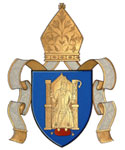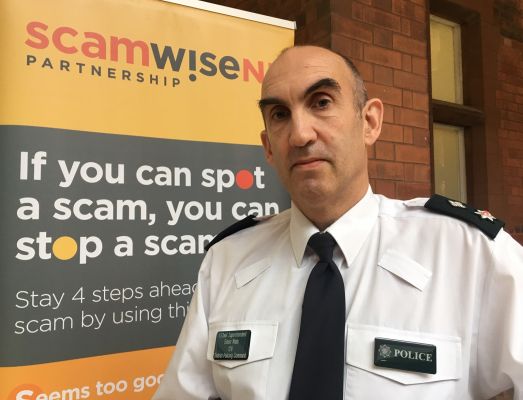 |
 |
News
Don't let the cold callers scam you

Chief Superintendent Simon Walls.
The Police Service of Northern Ireland is urging the public to be on their guard against cold callers and scammers who continue to prey on the community by taking advantage of householders, even during the Covid 19 pandemic.
Chief Superintendent Simon Walls said: “Unfortunately, during these unprecedented times there are still despicable people in our communities who are out to make money by taking advantage of others.
“Our advice about cold callers is especially important now because so many more people are either working from home, or self isolating at home. This means they can’t go about their daily routine as before, which can include buying their groceries, or other personal items, and this is what the scammers and cold callers are exploiting.
“We have seen instances where people are calling to the homes of older, or vulnerable people, telling them they will do their grocery shopping for them for a small fee. These people take the money but, cruelly, they never deliver the goods.
“I’m making a direct appeal to friends and loved ones of older people, or those who are vulnerable in our communities to please, take a few minutes and have a conversation with them about what they can do to help protect themselves and their homes.
“There are a number of initiatives which are really helpful, including the ‘No Cold Calling’, the ‘Nominated Neighbour’ scheme, QuickCheck, Neighbourhood Watch and ScamwiseNI Partnership and details of all of these can be found on our website at psni.co.uk
“For example, the Nominated Neighbour Scheme allows householders to nominate a person who will deal with callers to their home. If a caller arrives when you are alone in the house, they can be shown a card instructing them to contact your ‘Nominated Neighbour’, who will then try and check the caller’s identity avoiding the need for you to open your front door.
“You can contact your local crime prevention officer on 101 about the Nominated Neighbour Scheme and QuickCheck. By using QuickCheck, people can phone 101 to check the identity of callers to their home who claim to represent an energy or water network company.
“Finally, I would really urge people to always ask for proof of identity. If people are who they say they are, they will be happy to show you their ID.
“To avoid becoming the victim of a scam visit ScamwiseNI at www.nidirect.gov.uk/campaigns/scamwiseni or @ScamwiseNI
“If you have any concerns please speak to your Local Policing Team Officer or your Crime Prevention Officer on 101.”
Follow this advice when answering the door:
Report suspicious persons or vehicles being driven in a suspicious manner immediately
Before answering the front door, make sure the back door is locked.
If you have a door chain, remember to use it before opening the door. If not, we recommend you get one installed.
Ask the caller for their identification and check it carefully.
Ask them to wait outside and close the door genuine callers will not mind.
Ring Quick Check on 101. The call will be answered personally and promptly by a trained police call handler. They will check with the company that the person at the door is genuine. If they are not or they think that there is something suspicious, the operator will be able send the police to you.
Do not let anyone into the property until you are satisfied as to who they are.
The four main Churches and the Irish Council of Churches are supporting Scamwise NI through the Church Leaders Group.
In the Republic of Ireland, Gardaí across the State are being asked to actively identify those persons most at need, particularly those with limited local family or social support. In these cases, An Garda Síochána will assist.
Contingency vehicles will be used to maintain personal interactions and where needed to assist and support people, which may include collecting medical prescriptions, attending hospital appointments and other supports they may need.
An Garda Síochána will also use these opportunities to link identified people into local, national and state services where appropriate.
Any person with these concerns for themselves or for a neighbour should contact their local Garda station, Contact details, including email contact, for all Garda stations can be found on the Garda website or in any phonebook.